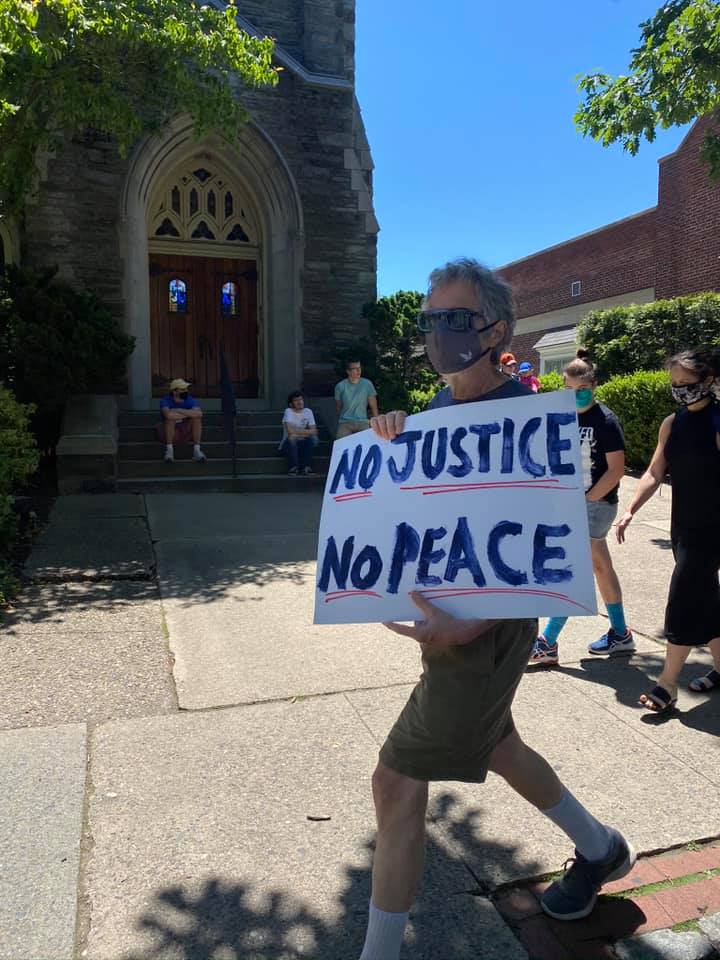
“No justice, no peace.” “Black lives matter.” “I can’t breathe.”
The calls of protesters across the country and in Camden County in the wake of George Floyd’s death are raising awareness of racism and police brutality in the country.
Floyd died after being detained by four Minneapolis police officers, one of whom pressed his knee on Floyd’s neck for eight minutes and 46 seconds, cutting off his oxygen and ignoring his pleas that he couldn’t breathe.
All four officers have been fired and face charges in connection with Floyd’s death. Derek Chauvin, the officer who put his knee on Floyd, has been charged with second-degree murder.
Police departments in Camden County refrained from wearing riot gear and some walked with protesters, supporting their pleas for justice in Camden City, Winslow Township and Haddonfield, among other towns.
“Peace protest is what we are looking for,” Winslow Township Mayor Barry Wright noted. “We marched from Family Dollar to Cross Keys and back. It’s good for young people to see that we want peace.
“We can’t sit back in our living rooms and say, ‘It was a terrible thing to happen.’ Terrible thing? It was a murder.”
Police chiefs in Camden, Haddonfield and Cherry Hill could not be reached for comment. But Cherry Hill Police Chief William Monaghan shared on the department’s Facebook page that his profession was stained once more by Floyd’s alleged murder. He understood the anger, sadness and frustration expressed by residents, but encouraged them to channel it into positive means for change.
Cherry Hill held a protest at the Cherry Hill Mall and beyond on June 2. Protests in Haddonfield and Winslow were held over the last weekend in May.
“Our hope is to build upon the words and actions of those who marched beside us today, as we continue our commitment to combating bias and racism,” Haddonfield Police Department shared on the town’s Facebook page.
New Jersey, as Winslow Township Police Chief George Smith explained, is above the national standard in policies against police brutality. Deescalation and bias training are offered to all officers, and the state submits all policy violations to county prosecutors for external review.
Winslow also publishes claims it receives regarding officers’ excessive use of force. The data can be accessed by visiting WinslowTownship.com/Police.
Officer Matthew Gibbons of Winslow attended his township’s protest as a police escort and shared on his Facebook the effect it had on him.
“I watched the organizer Ernest Brown lead this group of young children to older adults a total of just over five-and-a-half miles,” Gibbons wrote. “The group was respectful, loud, proud, raised their signs and were supported by so many passing vehicles and pedestrians.
“It was an honor for me to take a knee in solidarity.”
The kneels of officers flooded social media and garnered resounding applause from protesters.
“I don’t know what it feels like to live in the skin of an African American, as much as an African American doesn’t know what it feels like to live in the skin of a Caucasian,” Smith said. “If they’re a police officer or not, we don’t know what it’s like.
“I can empathize with you, but I truly don’t know.”
Smith added good officers outnumber bad, and that changes made by police internally benefit residents and officers alike. Police departments in each of the towns where protests were held had open conversations with residents that will continue as the state works to change its laws on policing and discrimination.
“We have so much more to go,” Wright urged. “We cannot stop until we can put our heads on our pillows and say we’ve done everything to stop racism by everyone, including police officers.”
















